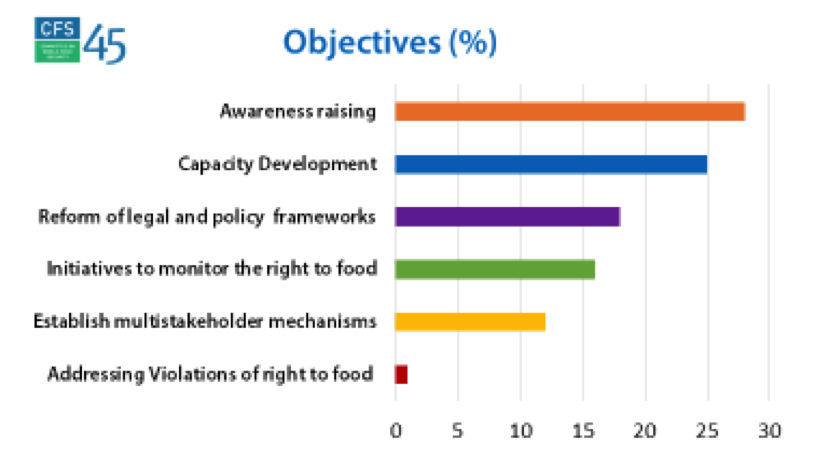Implementing the Right to Food Guidelines: Where are We?
The Voluntary Guidelines to Support the Progressive Realization of the Right to Adequate Food in the Context of National Food Security were endorsed by the Committee on World Food Security (CFS) and unanimously adopted by all member states of the Food and Agriculture Organization of the United Nations (FAO) in 2004.
The Guidelines have been central to CFS work since the Committee reformed in 2009 and the promotion of the right to food became part of its vision. This was an important development, as recognizing the right to food, and human rights in general, is fundamental to eliminating hunger and ensuring food security and nutrition.
The Guidelines represent the first attempt by governments to pragmatically interpret an economic, social and cultural right and to recommend multisectoral actions to be undertaken for its progressive realization. The Guidelines provide practical guidance to States and other key stakeholders for developing and adopting a wide range of measures that positively contribute to the progressive realization of the right to adequate food. These measures include national strategies, institutional, policy and legal frameworks, access to resources and assets, national financial resources and monitoring. The Guidelines are also highly relevant to the 2030 Agenda for Sustainable Development as they provide an overall framework to assess the governance of policies in the area of the food, agriculture and nutrition sectors.
The right to adequate food was originally introduced at the global level in the 1948 Universal Declaration of Human Rights. It became binding upon States Parties to the International Covenant on Economic, Social and Cultural Rights (ICESCR), which has been so far ratified by 168 States Parties. It reads: “the right to adequate food is realized when every man, woman and child, alone or in community with others, has physical and economic access at all times to adequate food or means for its procurement.”
WHERE ARE WE?
CFS held an event during the 45th session of the Committee in October 2018 to take stock of the use and application of the Guidelines. The decision to hold an event is in line with the Guidelines, which invites member states to report on a voluntary basis on relevant activities and progress achieved in implementing the Guidelines to CFS within its reporting procedures.
A call for inputs was issued to inform the event. Fifty-six contributions were received from governments, UN organizations, civil society, NGOs and academics, reporting experiences and good practices at national and regional levels in Africa, Asia, Europe, Latin America and the Caribbean and at a global level. There were 36 national submissions, 10 regional submissions and 10 global submissions. The experiences that were documented in the contributions were classified according to their main objectives, namely:
- Raising awareness to sensitize stakeholders to the existence and/or implementation of the Guidelines;
- Developing capacity to strengthen the ability of stakeholders to implement the Guidelines;
- Reforming legal and policy frameworks to better and more sustainably contribute to the realization of the right to adequate food;
- Monitoring the implementation of the Guidelines;
- Establishing multi-stakeholder mechanisms to leverage synergies of multi-stakeholder partnerships;
- Addressing violations of the right to food.
The graph below shows the prevalence of each of these objectives in the experiences documented in the contributions; most of these experiences having several objectives.

A number of catalysts for successful results were mentioned in the contributions and during the event. More than 80% highlighted the importance of an enabling environment, characterised by factors such as collaborative and supportive relations amongst all actors, awareness of the right to adequate food and of the Guidelines, inclusive and participatory processes, community engagement and participation, and media support.
Political will and commitment – reflected in the public budget dedicated to implementing the Guidelines – was also underlined as a key factor for success in the majority of contributions. Other catalysts that were mentioned were: the existence of institutional and legal frameworks within legislation on the right to food, food security and nutrition laws, programmes and action plans, established participatory mechanisms; technical support provided by UN organizations to facilitate the process and develop capacities; and evidence-based analysis, information and monitoring systems to evaluate the results and their impact.
Several good practices that contributed to making experiences successful were shared with the participants in the event. These included:
- Empowering stakeholders through increased awareness of their right to food and development of their capacity, which was raised in 90% of the contributions;
- Establishing multistakeholder dialogue platforms to channel disagreements and opposing views and to build consensus, which was mentioned in half of the contributions;
- Forming partnerships with key institutions capable of supporting capacity development and providing technical support on the right to food and food policy-making, such as FAO and other specialized UN agencies;
- Facilitating the development of participatory mechanisms where all groups of stakeholders, including those most affected by food insecurity and malnutrition, take part in the dialogue and decision-making processes in an equal, collaborative and transparent way;
- Establishing monitoring mechanisms related to achieving the right to food, including the set-up of monitoring institutions and access to recourse mechanisms.
WHAT’S NEXT?
The Guidelines were only adopted 14 years ago, and transferring international law into practice is a long process. Progress in implementing the Guidelines is encouraging considering the number of contributions received to inform the event, the presentations from panelists (from Bangladesh, Burkina Faso, Colombia, the European Economic and Social Committee and the Civil Society Mechanism) during the event, and the interventions from the floor. However, as the Civil Society Mechanism (CSM) noted, “human rights spaces were under threat with the rise of authoritarian governments, xenophobic and nationalistic forces, and the trends towards declining authority of public sector policy-making to the benefit of private sector entities and interests”. The UN Special Rapporteur on the Right to Food also highlighted the failures to refer to human rights in the Paris Climate Change Agreement of the IFCCC of 2015, the 2030 Agenda and other recent global commitments.
There is room for better and broader use of the Guidelines nationally and in CFS work, including in supporting country-led implementation of the 2030 Agenda, as was discussed during the event. CFS should continue to support countries in sharing their experiences on their efforts to achieve food security and nutrition-related targets, focusing primarily on SDG 2 and its linkages with other SDGs and relevant targets. The Guidelines are also relevant to SDG 16 on governance, which will be reviewed in July 2019 by the High-Level Political Forum (HLPF)[9], and to where CFS and Rome-Based Agencies could report on the results of the event and the process adopted to gather evidence.
–By Francois Trine, Senior Food Security Officer, FAO. To read the article at its original source, go here.

